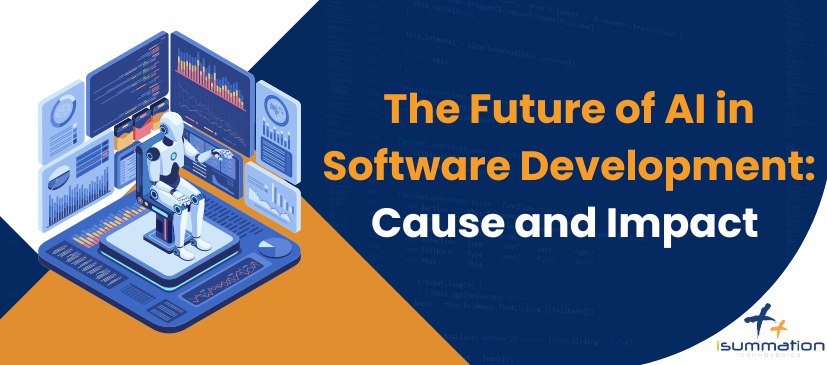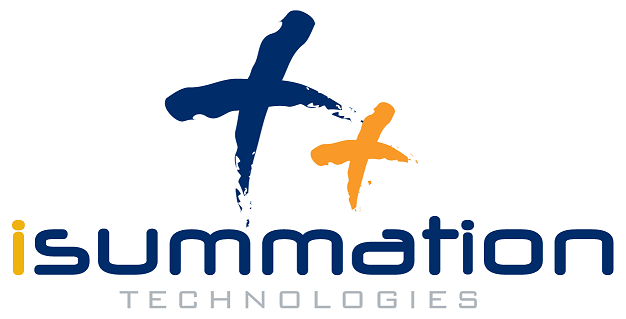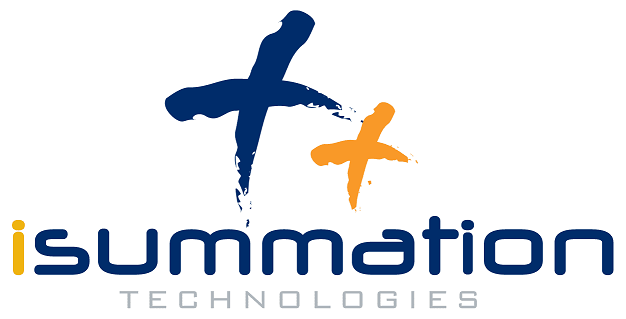- August 29, 2024
- Posted by: iSummation Team
- Category: Development

The intersection of artificial intelligence (AI) and software development is a rapidly evolving landscape that is set to redefine the industry. The implications of AI for developers are profound, from AI-assisted coding tools to fully autonomous development systems. This article explores the causes driving AI in software development, the current and potential impacts, and the future for developers and software engineers.
The Role of AI in Software Development
Artificial Intelligence has developed from a futuristic concept to a vital element in many industries and software development is one of them. AI’s influence extends across various aspects of software engineering, from code generation to debugging, testing, and deployment. The growing need for efficiency, accuracy, and innovation in software development has fueled the adoption of AI, making it an indispensable tool for developers.
The Evolution of AI in Software Development
AI’s journey in software development began with simple automation tools and has evolved into sophisticated systems capable of understanding and generating code. Early AI tools for software development focused on automating repetitive tasks, but the introduction of machine learning and deep learning techniques has enabled the development of AI systems that can receive data, identify conception, and make decisions autonomously.
AI for Developers: A New Norm
AI for developers is no longer a novelty; it is becoming a necessity. AI tools for software development have advanced to the point where they can assist developers in writing code, detecting bugs, and optimizing performance. These tools not only speed up the development process but also reduce the margin of error, leading to more reliable and robust software.
Key Drivers of AI Adoption in Software Development
Several factors contribute to the increasing adoption of AI in software development. These include:
The Need for Speed and Efficiency: The demand for faster development cycles has led to the adoption of AI tools that can automate time-consuming tasks such as code generation, testing, and deployment.
Complexity of Modern Software: As software systems become more complex, the need for intelligent tools to manage and streamline development processes has become apparent. AI tools for software engineering can handle the intricacies of modern software architectures, making them essential for developers.
Shortage of Skilled Developers: The growing demand for software engineers has outpaced the supply of skilled professionals. AI-assisted software development tools help bridge this gap by enabling developers to be more productive and efficient.
Advancements in AI Technology: The continuous development of AI technologies, such as natural language processing (NLP) and generative models, has opened new possibilities for AI in software development. These advancements have made AI tools more accessible and effective for developers.
The Impact of AI on Software Development
The integration of AI into software development is transforming the industry in several ways. Here are some considerable impacts of AI on the software development process:
AI-Assisted Code Generation
AI-assisted code generation is one of the most visible impacts of AI on software development. Tools like GitHub Copilot, powered by OpenAI’s Codex, can generate code snippets based on natural language prompts. This not only speeds up the development process but also reduces the cognitive load on developers, allowing them to focus on higher-level design and problem-solving.
Automated Testing and Debugging
AI tools for software development are also making strides in testing and debugging. AI-powered testing tools can automatically generate test cases, identify potential issues, and suggest fixes. This reduces the time and effort required for manual testing and debugging, leading to faster and more reliable software releases.
Enhanced Software Optimization
AI can analyze vast amounts of data to identify patterns and optimize software performance. AI tools for software development can suggest performance improvements, identify bottlenecks, and even predict future issues based on historical data. This leads to more efficient and optimized software systems.
AI in Software Development Life Cycle (SDLC)
AI is being integrated into various stages of the Software Development Life Cycle (SDLC), from planning and design to implementation and maintenance. AI tools can assist in project management, requirements analysis, and even the creation of user stories and personas. This holistic integration of AI into the SDLC is streamlining the development process and improving the overall quality of software products.

Challenges and Opportunities in AI-Driven Software Development
While the benefits of AI in software development are clear, there are also challenges that need to be addressed.
Ethical and Security Concerns
The use of AI in software development raises ethical and security concerns. For example, AI-generated code may inadvertently include biases or vulnerabilities. Ensuring that AI tools are transparent, secure, and free from bias is crucial for their widespread adoption.
The Future of Software Engineering Jobs
One of the most frequently asked questions is: “Will AI take over software engineering?” While AI will undeniably change the nature of software engineering jobs, it aggressively replaces human developers. Instead, AI will augment the capabilities of developers, allowing them to focus on more complex and creative tasks. The future of software engineering will involve a symbiotic relationship between humans and AI, where AI handles routine tasks, and developers focus on innovation.
The Need for AI-Related Skills
As AI becomes more prevalent in software development, there will be a growing demand for developers with AI-related skills. Understanding how to use AI tools effectively, as well as knowledge of machine learning and data science, will become increasingly important for software engineers.
Generative AI and the Future of Software Development
Generative AI, which can create new content from scratch, is poised to have a significant impact on software development. Generative AI models can create code, design interfaces, and even generate entire software applications. This could lead to a future where developers act more as supervisors, guiding AI systems to create software according to their specifications.
AI in Backend Engineering
AI’s impact is not limited to front-end development. In backend engineering such as ColdFusion technology, AI can optimize database queries, manage server loads, and even predict hardware failures. AI-assisted backend tools are making it easier for developers to manage complex systems, leading to more reliable and scalable applications.
AI Development Tools: Current and Future Trends
The market for AI development tools is rapidly expanding, with new tools being released regularly. Some of the latest AI tools for developers include automated code reviewers, AI-powered integrated development environments (IDEs), and machine learning platforms that simplify the integration of AI into software applications.
How to Use AI in Software Development
For developers looking to integrate AI into their workflow, there are several strategies to consider:
Start with AI-Assisted Tools: Begin by incorporating AI tools that assist with coding, testing, and debugging. These tools can provide immediate productivity boosts without requiring deep AI expertise.
Learn the Basics of Machine Learning: Understanding the basics of machine learning can help developers make the most of AI tools and even create their AI-driven solutions.
Experiment with Generative AI: Explore generative AI tools that can create code, design interfaces, and more. These tools are still in the early stages, but they offer a glimpse into the future of software development.
Stay Informed About AI Trends: The field of AI is constantly evolving, so it’s important to stay informed about the latest trends and tools. Joining AI and software engineering communities can provide valuable insights and keep you up to date.
How AI can play Key Role in Shaping the Future of Software Engineering
AI is not just a tool for software developers; it is a catalyst for change in the software engineering industry. The future of software engineering will be shaped by AI in several key ways:
AI-Driven Development Processes
AI will lead to the creation of new development processes that are more agile, efficient, and data-driven. AI tools will enable developers to make more informed decisions, automate routine tasks, and focus on innovation. This will result in faster development cycles and higher-quality software products.
The Rise of AI Software Developers
As AI becomes more integrated into software development, there will be a rise in the demand for AI software developers. These developers will specialize in creating and maintaining AI-driven tools and systems, ensuring that they are effective, secure, and scalable.
The Transformation of Software Engineering Education
The increasing importance of AI (Artificial Intelligence) in software development will also transform software engineering education. Universities and training programs will need to incorporate AI-related topics into their curricula, ensuring that the next generation of developers is equipped with the skills needed to succeed in an AI-driven industry.
Conclusion
The prospects of AI in software development are both compelling and challenging. AI has the potential to revolutionize the way software is developed, making the process faster, more efficient, and more innovative. However, this transformation will also require developers to adapt to new tools, learn new skills, and navigate the ethical and security challenges that come with AI.
For those in the software development industry, the key to success in an AI-driven future will be staying informed, embracing modern technologies, and continuously learning. The relationship between AI and software development is still in its early stages, but that is clear that AI will play a significant role in shaping the future of software engineering.
By understanding the causes driving AI adoption in software development and identifying its impact, developers can position themselves at the forefront of this transformative trend, ensuring that they are not only considered for the future but are actively shaping it.


